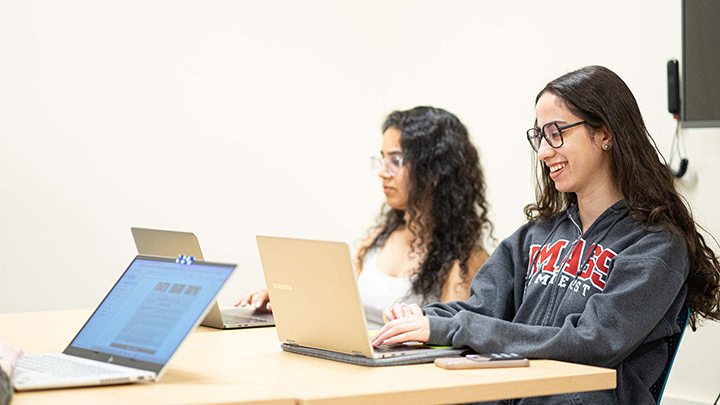The Quest for Ethical Tech

Sarah de Carvalho ’23 and Sapna Parihar, ’23, ’25MS
Artificial intelligence (AI) chatbots shook college campuses in late 2022, sending faculty members scrambling to regulate students’ use of AI. The swift rise of AI also caught the attention of the Biden administration, which opened a public commenting period to determine how to govern this growing technology field.
Dozens of UMass students answered the call, thanks to an assignment given by Informatics Program Director and Senior Teaching Faculty member Michelle Trim in her undergraduate and graduate-level computer science classes.
“Assume you’re designing the ethical rules for this piece of technology, and they have to be followed,” Trim told students. “What policies would you build?”
Eli Boahen ’24MS partnered with other computer science students to propose that Congress establish a regulatory agency akin to the IRS to audit AI developers, ensuring their products meet predetermined ethical standards before coming onto the market.
“Some folks were questioning whether or not they even wanted to work in computer science anymore because the ethics were so questionable, and that’s where the curiosity goes into urgency,” Boahen says. “When it comes to AI, it’s very, very real for us.”
In November 2023, the Biden administration did, in fact, issue an executive order directing the National Institute of Standards and Technology to develop standards for the safety, security, and testing of AI models—an evaluative model not unlike the one recommended by UMass students.
When Boahen applied for a master’s degree in data analytics and computational social science at UMass, they were interested in the ethics of using particular pieces of assistive technology such as continuous glucose monitors, which collect biometric data on people with diabetes to help them manage their diet and activity. Boahen was concerned about how device users were unable to consent to the distribution of their data.
“What made me want to go back to graduate school was a concern that I saw in the overlap of technology design and data ethics,” says Boahen, who found there was a “lack of conversation” surrounding this intersection and returned to school “to explore that conversation and see where it leads.”
Learning about AI ethics in Trim’s classroom made Boahen realize they wanted to pursue their doctoral degree after finishing graduate school. Many of Boahen’s classmates took Trim’s course during their final semester at UMass and have since gone on to work in programming or policymaking, where they are already feeling the effects of a budding AI revolution, Boahen says.
“There were folks who were questioning whether or not they even wanted to work in computer science anymore because the ethics were so questionable, and that’s where the curiosity goes into urgency,” says Boahen. “When it comes to AI, it’s very, very real for us.”
Having a real opportunity to speak to the White House and potentially shape future AI policies made for “a lot of joy in the classroom” during the class period when students formally submitted their comments to Congress, Trim says.
“What this activity did for students is it took a real situation where somebody important was genuinely saying, ‘What do you think about this?’” says Trim, who disagrees with those who claim that members of Generation Z don't care about current events. “I think young people feel disempowered, and feeling disempowered is very different from feeling disconnected or disengaged,” says Trim. “When you feel disempowered, you don’t necessarily know how to intervene or insert yourself, and it just all feels like a lot.”
During a semester when AI chatbots threatened to make human creativity obsolete, Trim’s students took advantage of the commenting period to work together and develop innovative strategies for regulating AI—no algorithms, just critical thinking.
“They always had things to say,” Trim says. “They were never tuned out, they just never had anybody ask them in a way that mattered.”
This article originally appeared in the Spring 2024 issue of UMass magazine.